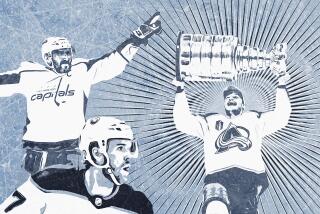Granato Checks Ego, Returns as Assistant
- Share via
DENVER — Everyone has at least a touch of ego, the little voice inside that tells us to speed up when we’re about to get passed on the highway, to take a pickup game a bit too seriously.
Take it to the arenas of professional sports and the hubris grows exponentially, machismo and fan idolatry fueling the need to prove worth.
Then there’s Tony Granato.
When it came time to fill a spot on the Colorado Avalanche coaching staff, Granato suggested hiring Joel Quenneville as head coach -- the position he held at the time.
Though Granato didn’t vote himself entirely off the island, agreeing to stay on as an assistant, his decision raised eyebrows and drew smirks from those around the NHL who figured there’s no way the self-demotion would work.
But the skeptics clearly don’t know Tony Granato. Those who do -- friends, family, members of the Avalanche organization -- never had a doubt that he would make a seamless transition.
“Especially around sports, you get a lot of that, a lot of macho, and unfortunately they can’t separate what they would realize to be a great opportunity like Tony has,” Avalanche forward Dan Hinote said. “They couldn’t swallow their pride enough to accept their roles and he’s a smart enough man to understand that this an opportunity and not a demotion. For him to be able to do that, it says a lot about him.”
It’s easy to understand how there might be misconceptions about Granato.
A two-way forward for three teams in 13 NHL seasons, Granato was a feisty player who would do whatever it took to win. Dropping his gloves against a bigger opponent, taking penalties, instigating others, Granato played cocky, as if what he did was all that mattered.
In reality, he often sacrificed offensive chances to drop back on defense and used scrappiness to make up for his lack of size -- all for the sake of the team.
It was the same thing in Granato’s 19 months as Colorado’s head coach.
Thrust into the position after little more than a season as an assistant, he was confident and honest from the start, almost taking on the air of someone who felt as if he deserved to move up the ladder quickly.
Truth is, Granato was thankful to get a head coaching job two years after his playing career ended, and his every move was made to get the most out of his players and project a professional image for the organization.
Lots of players and coaches talk about sacrificing for the team. Few live it like Granato.
“If you have an ego, then you’re not committed to your team and to your profession and your position, so hopefully I’ve never been looked at with a person who has an ego or looked at as someone who makes decisions based on my own needs instead of my team’s needs,” Granato said. “I don’t want to be like that and I hope that was never the case. In pro sports, for a team to work, for a team to be a success, you can’t have someone who thinks of himself first.”
Granato’s approach certainly made the transition back to assistant an easy one. The NHL lockout also helped.
With no games or practices, Granato and Quenneville spent much more time away from the ice than they normally would have. While the arena’s doors were locked, the two coaches worked out in the mornings, chatted at lunch and spent evenings coaching their kids’ teams.
Along the way, Granato and Quenneville learned they have many of the same interests, similar big families and nearly identical lifestyles. The bond carried over into the season and the transition has been so smooth that it’s almost as if they’ve been coaching together for years instead of months.
“It was great being around the guy. I got to know a little about what a class person and what he means as an individual,” Quenneville said. “He’s handled his situation very well. The transition has been real smooth and I commend him on how well he’s handled it.”
The way Granato sees it, his decision made the Avalanche better. Simple as that.
Colorado gets Quenneville, a defensive specialist who was the winningest coach in St. Louis Blues’ history and an assistant coach when the Avalanche won its first Stanley Cup in 1996. Quenneville gets a quality assistant, someone who knows the players and organization, and knows what a head coach needs.
More to Read
Go beyond the scoreboard
Get the latest on L.A.'s teams in the daily Sports Report newsletter.
You may occasionally receive promotional content from the Los Angeles Times.





